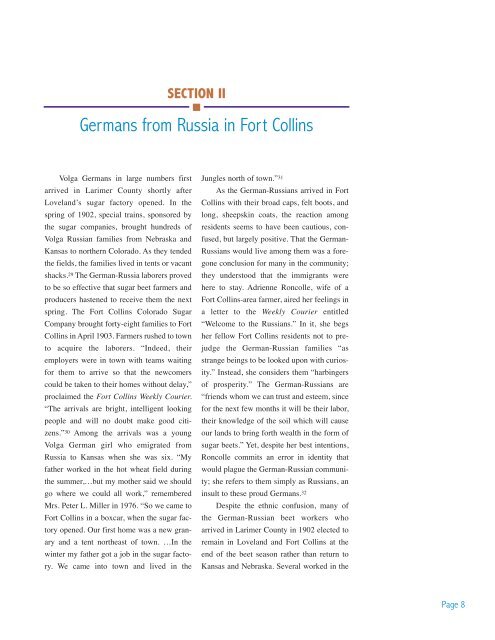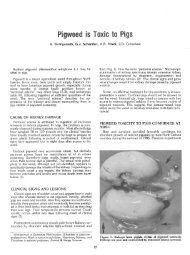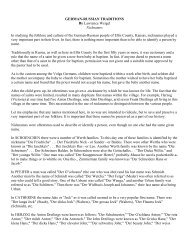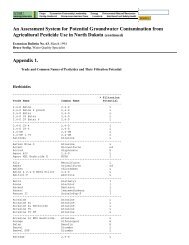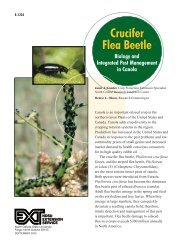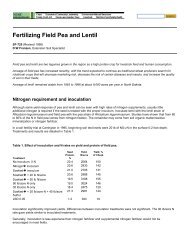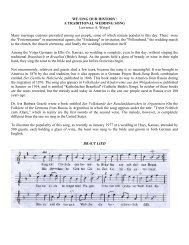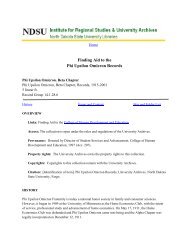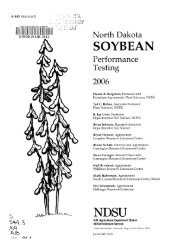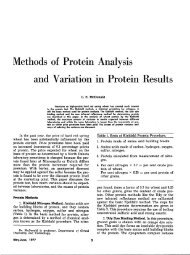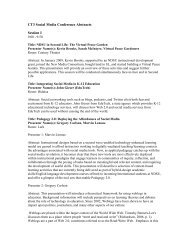germans from russia in fort collins, 1900-2000 - Libraries
germans from russia in fort collins, 1900-2000 - Libraries
germans from russia in fort collins, 1900-2000 - Libraries
Create successful ePaper yourself
Turn your PDF publications into a flip-book with our unique Google optimized e-Paper software.
SECTION II<br />
Germans <strong>from</strong> Russia <strong>in</strong> Fort Coll<strong>in</strong>s<br />
Volga Germans <strong>in</strong> large numbers first<br />
arrived <strong>in</strong> Larimer County shortly after<br />
Loveland’s sugar factory opened. In the<br />
spr<strong>in</strong>g of 1902, special tra<strong>in</strong>s, sponsored by<br />
the sugar companies, brought hundreds of<br />
Volga Russian families <strong>from</strong> Nebraska and<br />
Kansas to northern Colorado. As they tended<br />
the fields, the families lived <strong>in</strong> tents or vacant<br />
shacks. 29 The German-Russia laborers proved<br />
to be so effective that sugar beet farmers and<br />
producers hastened to receive them the next<br />
spr<strong>in</strong>g. The Fort Coll<strong>in</strong>s Colorado Sugar<br />
Company brought <strong>fort</strong>y-eight families to Fort<br />
Coll<strong>in</strong>s <strong>in</strong> April 1903. Farmers rushed to town<br />
to acquire the laborers. “Indeed, their<br />
employers were <strong>in</strong> town with teams wait<strong>in</strong>g<br />
for them to arrive so that the newcomers<br />
could be taken to their homes without delay,”<br />
proclaimed the Fort Coll<strong>in</strong>s Weekly Courier.<br />
“The arrivals are bright, <strong>in</strong>telligent look<strong>in</strong>g<br />
people and will no doubt make good citizens.”<br />
30 Among the arrivals was a young<br />
Volga German girl who emigrated <strong>from</strong><br />
Russia to Kansas when she was six. “My<br />
father worked <strong>in</strong> the hot wheat field dur<strong>in</strong>g<br />
the summer,…but my mother said we should<br />
go where we could all work,” remembered<br />
Mrs. Peter L. Miller <strong>in</strong> 1976. “So we came to<br />
Fort Coll<strong>in</strong>s <strong>in</strong> a boxcar, when the sugar factory<br />
opened. Our first home was a new granary<br />
and a tent northeast of town. …In the<br />
w<strong>in</strong>ter my father got a job <strong>in</strong> the sugar factory.<br />
We came <strong>in</strong>to town and lived <strong>in</strong> the<br />
Jungles north of town.” 31<br />
As the German-Russians arrived <strong>in</strong> Fort<br />
Coll<strong>in</strong>s with their broad caps, felt boots, and<br />
long, sheepsk<strong>in</strong> coats, the reaction among<br />
residents seems to have been cautious, confused,<br />
but largely positive. That the German-<br />
Russians would live among them was a foregone<br />
conclusion for many <strong>in</strong> the community;<br />
they understood that the immigrants were<br />
here to stay. Adrienne Roncolle, wife of a<br />
Fort Coll<strong>in</strong>s-area farmer, aired her feel<strong>in</strong>gs <strong>in</strong><br />
a letter to the Weekly Courier entitled<br />
“Welcome to the Russians.” In it, she begs<br />
her fellow Fort Coll<strong>in</strong>s residents not to prejudge<br />
the German-Russian families “as<br />
strange be<strong>in</strong>gs to be looked upon with curiosity.”<br />
Instead, she considers them “harb<strong>in</strong>gers<br />
of prosperity.” The German-Russians are<br />
“friends whom we can trust and esteem, s<strong>in</strong>ce<br />
for the next few months it will be their labor,<br />
their knowledge of the soil which will cause<br />
our lands to br<strong>in</strong>g <strong>fort</strong>h wealth <strong>in</strong> the form of<br />
sugar beets.” Yet, despite her best <strong>in</strong>tentions,<br />
Roncolle commits an error <strong>in</strong> identity that<br />
would plague the German-Russian community;<br />
she refers to them simply as Russians, an<br />
<strong>in</strong>sult to these proud Germans. 32<br />
Despite the ethnic confusion, many of<br />
the German-Russian beet workers who<br />
arrived <strong>in</strong> Larimer County <strong>in</strong> 1902 elected to<br />
rema<strong>in</strong> <strong>in</strong> Loveland and Fort Coll<strong>in</strong>s at the<br />
end of the beet season rather than return to<br />
Kansas and Nebraska. Several worked <strong>in</strong> the<br />
Page 8


